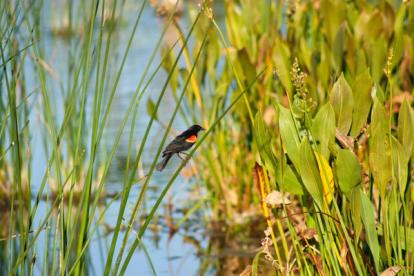
Will it all come out in the wash? A laundry list of false sustainability claims to avoid
by Emily Williams
View post

It is widely recognised that the planet is experiencing long-term shifts in weather patterns and global temperatures, due to human activities. This has been largely driven by the burning of fossil fuels for energy and transportation, which in turn releases significant amounts of CO2 into the atmosphere. The accumulation of these greenhouse gases then traps heat from the sun and causes the Earth’s temperature to rise.
Wide-scale deforestation, industrial processes and agricultural practices also contribute to these emissions, and while the overall approach to mitigating and adapting to climate change is centred on decarbonisation, Nature-based Solutions (NbS) can also play a crucial role, with estimates suggesting that NbS can provide 37% of the mitigation needed until 2030 to achieve the targets of the Paris Agreement.
NbS are actions to protect, sustainably manage and restore natural and modified ecosystems that address societal challenges effectively and adaptively, simultaneously benefiting people and nature. These solutions are based on the principle that healthy ecosystems can provide a range of benefits, including carbon sequestration, climate regulation, water management, biodiversity conservation and human wellbeing. These are also sometimes referred to as Natural Climate Solutions, particularly when specifically aimed at climate mitigation, while NbS are often aimed at wider benefits including alternatives to engineered solutions and wider social and biodiversity benefits.
NbS also underpin the UN Sustainable Development Goals supporting vital ecosystem services, biodiversity, access to fresh water, improved livelihoods, healthy diets, and food security from sustainable food systems. In 2021, the UN’s Environment Programme acknowledged the importance of NbS by stating that “equitable and resilient nature-based solutions can mitigate climate change while simultaneously strengthening both ecosystems and communities’ resilience to climate change feedbacks and impacts”.
So what are some of the key ways in which NbS can help in tackling climate change?
Natural ecosystems, such as forests, wetlands and grasslands, can absorb and store significant amounts of carbon dioxide from the atmosphere through photosynthesis. By protecting and restoring these habitats and ecosystems, NbS can enhance carbon sequestration, helping to mitigate climate change.
For example, seagrass, the world’s only flowering plant capable of living in seawater, captures carbon up to 35 times faster than tropical rainforests, accounting for 10-18% of total ocean carbon storage. And despite covering less than 0.1% of the seafloor, it also provides food, habitat and nursery areas for numerous vertebrate and invertebrate species.
The challenge is that currently seagrasses are being lost and are adversely affected by global stressors: deoxygenation, ocean acidification and warming temperatures. There are many other natural ways to sequester carbon, through reforesting, rewilding, or the reclamation of agricultural land that will allow carbon capture on the largest scales, as will removing pollutants from our seas, lakes and oceans.

Ecosystems contribute to climate regulation through processes such as evapotranspiration, which cools the environment, and the release of aerosols that affect cloud formation. Therefore, preserving and restoring natural habitats through restorative actions, reforestation, rewilding and reclamation of agricultural land, can help maintain local and regional climate patterns, reducing the impacts of extreme weather events.
Healthy ecosystems provide critical services for communities in adapting to climate change impacts. Coastal wetlands, for example, act as natural buffers against storm surges and sea-level rise, protecting coastal communities. NbS can enhance the resilience of vulnerable areas by restoring or creating natural infrastructure, such as mangrove forests, which provide coastal protection and support biodiversity.
Reforestation and afforestation can be effective nature-based solutions for flood risk management. Planting trees and restoring forest cover can help to reduce the runoff and soil erosion, regulate water flow and improve soil structure.
Ecosystems play a vital role in water regulation, filtration and purification. Forests and wetlands act as natural sponges, absorbing and storing water during heavy rainfall and releasing it slowly, reducing the risk of flooding. NbS can help improve water security by preserving or restoring watersheds, protecting water sources, and implementing sustainable land management practices.

Conserving and restoring ecosystems through NbS also supports biodiversity conservation. Healthy ecosystems host the most diverse plant and animal species, which are essential for ecosystem functioning, resilience and long-term sustainability; this in turn is critical for meeting the challenges of climate change.
NbS can provide a range of socio-economic benefits, such as job creation, sustainable livelihoods and improved human wellbeing. Examples include ecotourism, sustainable agriculture practices and nature-based recreational activities.
But NbS are not without challenges. While they clearly have a significant role to play, there are concerns about the way NbS are implemented. Firstly, how these could be used for offsetting purposes and, in doing so, could delay the broader decarbonisation process; and also the risks of their impact on existing biodiversity coupled with local communities and indigenous peoples.
Finally, it is also critical that any NbS are properly managed, with a long-term commitment to quality and integrity. Seeking to build consensus on what is good practice, the International Union for Conservation of Nature (IUCN) published its Global Standard for Nature-based Solutions in 2020.
Another barrier is the relatively small amount of finance directed towards NbS and the need to significantly scale this up both from governments, and from private finance (including actions within companies’ own value chains). Some of the necessary pace of change will be driven by companies starting to understand their own impacts, through the increasing need to report and disclose on their interface with nature, to improve this across their value chains.
Overall, while decarbonising our economies is critical to meeting the challenge of climate change, nature-based solutions provide a significant opportunity to accelerate beneficial and sustainable approaches to addressing climate change.
Delivering on this ambition will require experts (including ecologists, hydrologists, engineers, soil scientists, economists, social scientists, and climate scientists) working collaboratively to plan, design and implement schemes and ensure their long-term success. However, by integrating NbS into climate change strategies, policymakers, communities, and businesses can harness the power of nature to reduce greenhouse gas emissions, enhance resilience and promote more sustainable development.
If you would like help in understanding how NbS can play a role for you, please get in touch.

by Emily Williams

by Stuart Heather-Clark, Sue Reuther, Stephan Van Den Berg

by Miguel Oyarbide, Alisha Lewis, Charlie Hodkinson-Ashford, Germán Saenz, James Scott, Nikkie Vinke